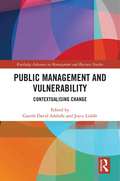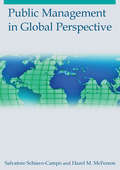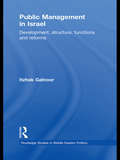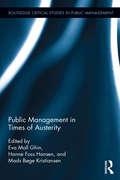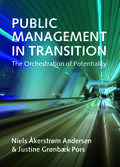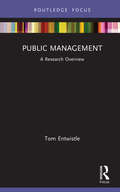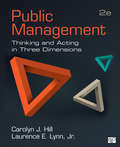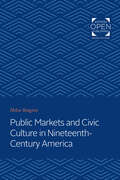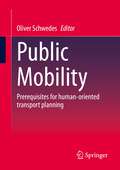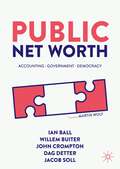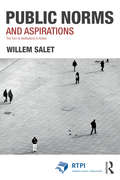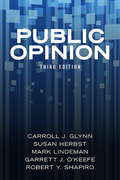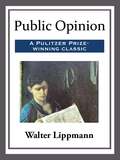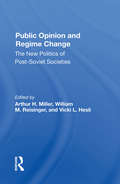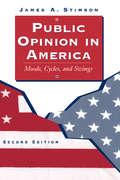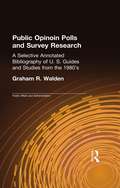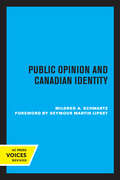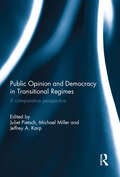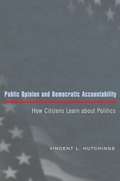- Table View
- List View
Public Management and Vulnerability: Contextualising Change (Routledge Advances in Management and Business Studies)
by Gareth David AddidleThis book locates the issue of ‘vulnerability’ in an international context, within public-sector reform processes, and goes beyond the conceptualization of existing concepts of policing and vulnerability to include multi- and intra-agency working. It uncovers many competing and contradictory conceptualisations of the phenomenon and shows how a variety of agencies in different jurisdictions prioritise and operationalise this escalating 21st-century social problem. Two recurring themes of this edited collection are the ways in which non-state organisations and agencies have become an acknowledged feature of modern service delivery, and how the withdrawal of the state has heralded a perceptive shift from collective or community provision towards the stigmatization of individuals. Increasingly, public service professionals and ‘street level bureaucrats’ work in collaboration with non-state agents to attempt to ameliorate vulnerability. Chapter contributions were deliberately drawn from combinatory empirical, theoretical, policy and practice fields, and diverse academic and policy/professional authors. Editors and authors deliberately cast their nets widely to provide integrative scholarship, and contributions from international perspectives to confirm the complexity; and how socio/cultural, political and historic antecedents shape the definitions and responses to vulnerability. This collection will appeal to academics, policy makers and practitioners in a wide variety of disciplines, such as public management and leadership, criminology, policing, social policy, social work, and business management, and any others with an interest in or responsibility for dealing with the issue of vulnerability.
Public Management and the Rule of Law
by Julia BeckettFilled with practical tools and guidelines, this book addresses an essential competence for public managers - incorporating governance and law in public administration. It links democratic constitutional values to administrative decision making and practices by stressing how public law authorizes, informs, and democratically constrains public servants in fulfilling public policies. The author addresses important aspects of governance in chapters that discuss democratic values of the rule of law, constitutional law, legislation and policy, administrative law, judicial practice, contract law, and tort law. The book also considers the practical aspects of public management (such as tax collection, benefits administration, personnel administration, and more), with application guidelines and techniques based on thorough legal grounding.
Public Management in Global Perspective
by Salvatore Schiavo-Campo Hazel M. McFersonWritten by two authors with a wide range of experience in international affairs, this introductory text addresses both the commonalities and diversity of administrative practice around the world, including a succinct but thorough overview of PA in the United States. It combines solid conceptual foundations with strong coverage of nuts-and-bolts "how to" topics, such as personnel management, procurement, and budgeting, and covers both developed countries and developing and transitional economies.The book's chapters are organized into four major sections: government functions and organization; management of government activity; interaction between government and citizens; and prospects of administrative reform. Plentiful illustrations and examples throughout the book, and "What to Expect" sections and discussion questions in each chapter, make this an ideal text for any PA course that takes a global perspective.
Public Management in Israel: Development, Structure, Functions and Reforms (Routledge Studies in Middle Eastern Politics)
by Itzhak GalnoorAs government management in Israel is gradually replaced by private sector management, it is becoming apparent that the collective-oriented mission of government cannot be fulfilled by the private sector or by the non-profit organizations of civil society. This book provides an analysis of the machinery of government in Israel, highlighting the inadequacy of the private sector as an alternative and how public management will need to cope with the new challenges and pressures of the 21st century. Providing hitherto unpublished data and analysis in English for the first time, this book gives a comprehensive analysis of the issue of public and private-sector management. The author examines the tasks of the civil service; the legal foundation of the public management machinery; and the profile of civil servants, and looks at the unwieldy budget process; the prevalence (and absence) of regulation; and external and internal mechanisms of oversight. This analysis is balanced by a detailed exposition of Israel's political-administrative culture with its excessive centralization, secrecy, turf protection, and legacy of improvisation, and their effect on policymaking and administration. This comprehensive and detailed examination of public management in Israel will be of great interest both to students and scholars of business and management, government and politics, and to policymakers in the region.
Public Management in Times of Austerity (Routledge Critical Studies in Public Management)
by Hanne Foss Hansen Eva Moll Sørensen Mads Bøge KristiansenSince 2008, the world has experienced an enormous decrease of wealth. By many measures the impact of the crisis was severe. The fall in GDP, the collapse of world trade, the rise in unemployment, and the credit slump reached bigger proportions than in any other crisis since World War II. Although the economic figures seem to improve in some countries, the crisis continues being a challenging issue and is said to be one of the most important problems governments face today. The crisis has put public finances under ever increasing pressure, and governments have responded through austerity measures such as new fiscal rules and budgeting procedures and cutbacks of public spending. Public Management in Times of Austerity seeks to explore the austerity policies adopted by European governments and their consequences to public management. It asks how governments have implemented new rules leading to more stringency in public budgeting and financial management, and how they have cut back public expenditure. These questions are examined comparatively through case studies in different parts of Europe, and variations across countries are discussed and explained. Throughout the volume, the consequences of the crisis and austerity policies for public management are discussed. What is the relationship between crisis and decision-making in the public sector, and how does austerity affect public-sector organisation? As the previous crisis in the 1970s resulted in a major reform movement, which was later referred to as New Public Management, Public Management in Times of Austerity look to understand whether the current crisis also leads to a wave of public management reform, and if so what is the content of this?
Public Management in Transition: The Orchestration of Potentiality
by Niels Åkerstrøm Andersen Justine Grønbæk PorsThis textbook is the first to examine how new trends such as “radical innovation”, “co-creation” and “potentialization” challenge fundamental values in the public sector. The authors bridge traditional public management approaches that tend to exclude social and societal problems, with broader social theories apt to capture new dilemmas and challenges. The book shows how the effects of new forms of managerialism penetrate the state, local governments, welfare institutions as well as professional work and citizens’ rights. It facilitates a discussion about how basic values are put at stake with new reforms and managerial tools. The book is ideal for postgraduate students in the area of public policy and public management with an interest in managing and leading public administration units and welfare institutions.
Public Management: A Research Overview (State of the Art in Business Research)
by Tom EntwistlePublic Management: A Research Overview provides a structured survey of the state of the art of public management research. Looking at the enduring themes of bureaucracy, autonomy, markets and collaboration, each chapter introduces key foundational studies before reviewing contemporary research. Although originally intended to maximise efficiency, work on bureaucracy points to the problems of red tape, contested accountabilities, performance management, merit and public service motivation. Autonomy research asks whether reforms intended to free subservient agencies from red tape and political interference have delivered the goods. Are autonomous service managers more focused on the needs of citizen-consumers and more entrepreneurial in their appetite for innovation? Marketisation reforms take a further step away from bureaucratic forms of control by exposing public services to market forces of one form or another. Competitive contracting and privatisation put public services into real markets while quasi-markets and yardstick competition try to recreate these pressures without private ownership. Perhaps reacting to the fragmentation unleashed by unbundling and marketisation, collaboration promises to deliver improvement through voluntary processes of negotiation and exchange. Vertical forms of collaboration between different levels of government, or between governments and citizens, promise a better match between policies and problems. Lateral collaboration between agencies working at the same level are intended to tackle the so-called wicked issues that fall between jurisdictions or else to share services and unlock economies of scale. The book concludes by considering the new challenges facing public management from global warming to the rise of populism and affective polarisation. Drawing on evidence from across the world, the book will speak to all those studying and practising public management.
Public Management: Thinking and Acting in Three Dimensions
by Carolyn J. Hill Laurence E. LynnManaging in the public sector requires an understanding of the interaction between three distinct dimensions—administrative structures, organizational cultures, and the skills of individual managers. Public managers must produce results that citizens and their representatives expect from their government while fulfilling their constitutional responsibilities. In Public Management: Thinking and Acting in Three Dimensions, authors Carolyn J. Hill and Laurence E. Lynn, Jr. argue that one-size-fits-all approaches are inadequate for dealing with the distinctive challenges that public managers face. Drawing on both theory and detailed case studies of actual practice, the authors show how public management that is based on applying a three-dimensional analytic framework—structure, culture, and craft—to specific management problems is the most effective way to improve the performance of America’s unique scheme of governance in accordance with the rule of law. The book educates readers to be informed citizens and prepares students to participate as professionals in the world of public management.
Public Management: Thinking and Acting in Three Dimensions
by Carolyn J. Hill Laurence E. LynnManaging in the public sector requires an understanding of the interaction between three distinct dimensions—administrative structures, organizational cultures, and the skills of individual managers. Public managers must produce results that citizens and their representatives expect from their government while fulfilling their constitutional responsibilities. In Public Management: Thinking and Acting in Three Dimensions, authors Carolyn J. Hill and Laurence E. Lynn, Jr. argue that one-size-fits-all approaches are inadequate for dealing with the distinctive challenges that public managers face. Drawing on both theory and detailed case studies of actual practice, the authors show how public management that is based on applying a three-dimensional analytic framework—structure, culture, and craft—to specific management problems is the most effective way to improve the performance of America’s unique scheme of governance in accordance with the rule of law. The book educates readers to be informed citizens and prepares students to participate as professionals in the world of public management.
Public Markets and Civic Culture in Nineteenth-Century America (Creating the North American Landscape)
by Helen TangiresOriginally published in 2003. In Public Markets and Civic Culture in Nineteenth-Century America Helen Tangires examines the role of the public marketplace—social and architectural—as a key site in the development of civic culture in America. More than simply places for buying and selling food, Tangires explains, municipally owned and operated markets were the common ground where citizens and government struggled to define the shared values of the community. Public markets were vital to civic policy and reflected the profound belief in the moral economy—the effort on the part of the municipality to maintain the social and political health of its community by regulating the ethics of trade in the urban marketplace for food. Tangires begins with the social, architectural, and regulatory components of the public market in the early republic, when cities embraced this ancient system of urban food distribution. By midcentury, the legalization of butcher shops in New York City and the incorporation of market house companies in Pennsylvania challenged the system and hastened the deregulation of this public service. Some cities demolished their marketing facilities or loosened restrictions on the food trades in an effort to deal with the privatization movement. However, several decades of experience with dispersed retailers, suburban slaughterhouses, and food transported by railroad proved disastrous to the public welfare, prompting cities and federal agencies to reclaim this urban civic space.
Public Medical Insurance Reforms in China
by Xinxin MaThis book investigates public medical insurance reform in China and studies its effects from both institutional and empirical study perspectives. It provides the reader with academic evidence for understanding the transformation of public medical insurance and its effect on the utilization of healthcare services, expenditure for medical care, individuals’ financial portfolio allocation, and well-being. The main content of the book comprises two parts. First, institutional transformations of public medical insurance are considered: medical insurance reform in rural and urban China, and problems of medical insurance reform in the country. Second, it looks at the impact of public medical insurance reforms in China: evidence-based on empirical studies, including determinants of participation in medical insurance, the New Rural Cooperative Medical Scheme and its effects on the utilization of healthcare services, medical insurance and its effects on out-of-pocket expenditure, risky financial market participation, and well-being in China. This study provides academic evidence about these issues based on economic theories and econometric methods using many kinds of nationwide Chinese representative survey data. The book is highly recommended to readers who are interested in up-to-date and in-depth empirical studies on the mechanisms of participation in medical insurance and the impact of public medical insurance reforms on individuals and household behaviors in China. This volume will be of interest to those who are interested in the Chinese economy, social security policymakers, and scholars with an econometric analysis background.
Public Mobility: Prerequisites for human-oriented transport planning
by Oliver SchwedesThis is to summarise current new developments in public transport and, with the concept of public mobility, to outline the concrete idea of a sustainable public transport system. In addition to the new mobility services and the political and legal framework conditions, new instruments are presented with which public mobility can be actively shaped in the future. The concept of public mobility ties in with the claim of public transport and shows how mobility can be offered to all citizens in an economically efficient, ecologically compatible and socially just manner under the changed social framework conditions.
Public Net Worth: Accounting – Government - Democracy
by Jacob Soll Dag Detter Ian Ball Willem Buiter John CromptonAs individuals, we depend on the services that governments provide. Collectively, we look to them to tackle the big problems - from long-term climate and demographic change to short-term crises like pandemics or war. Funding this activity, and managing the required finances sustainably, is difficult – and getting more so. But governments don't provide – or use – basic financial information that every business is required to maintain. They ignore the value of public assets and most liabilities. This leads to inefficiency and bad decision-making and piles up problems for the future. Governments need to create balance sheets that properly reflect assets and liabilities, and to understand their future obligations and revenue prospects. Net Worth – both today and for the future – should be the measure of financial strength and success.Only if this information is put at the centre of government financial decision-making can the present challenges to public finances around the world be addressed effectively, and in a way that is fair to future generations.The good news is that there are ways to deal with these problems and make government finances more resilient and fairer to future generations. The facts, and the solutions, are non-partisan, and so is this book. Responsible leaders of any political persuasion need to understand the issues and the tools that can enable them to deliver policy within these constraints.
Public Norms and Aspirations: The Turn to Institutions in Action (RTPI Library Series)
by Willem SaletThe aspirations of individuals, organizations, and states, and their perceptions of problems and possible solutions circulate fast in this instantaneous society. Yet, the deliberation of the underlying public norms seems to escape the attention of the public. Institutions enable people to have reliable expectations of one another even when they are unsure of each other's aspirations and purposes. Public norms enable people to act under conditions of increasing uncertainty. To fulfill this role in society, institutions need enhancement, maintenance, and innovation. Public Norms and Aspirations aims to improve the methodology of planning research and practice by exploring the co-evolution of institutional innovation and the philosophy of pragmatism in processes of action. As most attention in planning research and planning practices goes to the pragmatic approaches of aspirations and problem solving, the field is awaiting an upgrade of institutional perspectives. This book aims to explore the interaction of institutional and pragmatic thought and to suggest how these two approaches might be integrated and applied in successful planning research. Searching this combination at the interface of sociology, planning, and law, Salet opens a unique niche in the existing planning literature.
Public Opinion
by Susan Herbst Carroll J. Glynn Robert Y. Shapiro Mark Lindeman Garrett J. O'KeefePublic Opinion is a comprehensive and multidisciplinary examination of public opinion in the United States. Drawing on scholarship in political science, psychology, sociology, and communications, the authors explore the nature of political and social attitudes in the United States and how these attitudes are shaped by various institutions, with an emphasis on mass media. The book also serves as a provocative starting point for the discussion of citizen moods, political participation, and voting behavior. Feature boxes and illustrations throughout help students understand all aspects of the elusive phenomenon we call public opinion. The third edition has been thoroughly revised and updated to reflect how public opinion is studied today, and to incorporate current data and debates. The book now contains two revised and reframed theory chapters--"Group Membership and Public Opinion” and "Public Opinion and Social Process”--as well as new coverage of the influence of online and social media on public opinion, especially in issue opinions and campaigns.
Public Opinion
by Walter LippmannPublic Opinion exposes how media can shape public perception and how that perception changes society. Walter Lippmann is a two-time Pulitzer Prize-winner and visionary.
Public Opinion
by Walter LippmannControversial and compelling, this 1922 work by a two-time Pulitzer Prize-winner remains ever vital. Walter Lippmann is ranked among the most influential public figures of his era, and his reputation endures as one of history's greatest journalists. In Public Opinion, Lippmann examines democratic theory, citizenship in a democratic society, and the role of the media in forming public perceptions, expectations, and actions."Where mass opinion dominates the government," the author observes, "there is a morbid derangement of the true functions of power. The derangement brings about the enfeeblement, verging on paralysis, of the capacity to govern. This breakdown in the constitutional order is the cause of the precipitate and catastrophic decline of Western society," he warned, adding, "It may, if it cannot be arrested and reversed, bring about the fall of the West."Public Opinion explores censorship and privacy, stereotypes, leadership, and the image of democracy. In doing so, it changed the nature of political science as a scholarly discipline, helped launch the profession of public relations, and introduced concepts that continue to play an important role in current political theory. It remains essential reading for students and others with an interest in politics, journalism, and history.
Public Opinion And Regime Change: The New Politics Of Post-soviet Societies
by Arthur H Miller William M Reisinger Vicki HesliThis volume reports a research that represents some of the collaborative efforts aimed at investigating political attitudes and behaviors in the broader Soviet society, examining the public opinion constraints on efforts to transform the new organizations into a competitive political party system.
Public Opinion In America: Moods, Cycles, And Swings, Second Edition (Transforming American Politics (4th Edition))
by James StimsonPublic opinion matters. It registers itself on the public consciousness, translates into politics and policy, and impels politicians to run for office and, once elected, to serve in particular ways.This is a book about opinion?not opinions. James Stimson takes the incremental, vacillating, time-trapped data points of public opinion surveys and transforms them into a conceptualization of public mood swings that can be measured and used to predict change, not just to describe it. To do so, he reaches far back in U.S. survey research and compiles the data in such a way as to allow the minutiae of attitudes toward abortion, gun control, and housing to dissolve into a portrait of national mood and change.Using sophisticated techniques of coding, statistics, and data equalization, the author has amassed an unrivaled database from which to extrapolate his findings. The results go a long way toward calibrating the folklore of political eras, and the cyclical patterns that emerge show not only the regulatory impulse of the 1960s and 1970s and the swing away from it in the 1980s; the cycles also show that we are in the midst of another major mood swing right now?what the author calls the ?unnoticed liberalism? of current American politics.Concise, suggestive, and eminently readable, Public Opinion in America is ideal for courses on public opinion, public policy, and methods, as well as for introductory courses in American government. Examples and illustrations abound, and appendixes document the measurement of policy mood from survey research marginals. This revised second edition includes updated data on public opinion and voters through the 1996 presidential election.
Public Opinion Polls and Survey Research: A Selective Annotated Bibliography of U. S. Guides & Studies from the 1980s (Public Affairs and Administration #Vol. 24)
by Graham R. WaldenFirst Published in 1990. Routledge is an imprint of Taylor & Francis, an informa company.
Public Opinion and American Foreign Policy
by Ole R. HolstiThoroughly revised edition of an essential text, incorporating a wealth of new material on American foreign policy since 9/11. The second edition of this concise masterwork includes vast amounts of new material on American foreign policy in the post-9/11 era, including the war in Iraq. Holsti explores the poorly understood role of public opinion in international affairs, looking at Americans' capacity to make informed judgments about issues far removed from their personal experience. "Impressively comprehensive and current: an excellent revision of a book by the #1 authority on the topic. This new edition will remain at the forefront for consultation and textbook adoption on the topic for years to come. " -Bruce Russett, Yale University "I thought the first edition was the best single treatment of the subject-so, apparently, did the student who 'borrowed' my copy-and this is a worthy successor. The new edition almost flawlessly accomplishes the goal Holsti sets for himself: an update of his landmark book in light of emerging research and the dramatically changed state of the world that confronts U. S. foreign policy. " -Randy Siverson, University of California, Davis "For those who are curious about the impact of 9/11 on American public opinion, for serious students of the relationship between foreign policy and public opinion, for anyone who wants to understand contemporary American opinion about the United States' place in the world, and for citizens tired of conventional wisdom about a difficult and important subject, Holsti's study is not only interesting and topical, it is essential. " -Maxine Isaacs, Kennedy School of Government, Harvard University "In an age of almost weekly polling on foreign policy, Holsti's insights are indispensable. He delivers double tour de force in this new edition, providing his own current and historical research along with a comprehensive synthesis of the existing literature. His analysis of the relationships between public opinion and foreign policy since 9/11 will prove particularly valuable for students and scholars alike. " -Richard Eichenberg, Tufts University "Holsti combines a vast knowledge of political history and a mastery of the relevant scholarship with up-to-date empirical data to address the question of what role the general public can play in shaping foreign policy. This revised edition is a remarkable achievement. " -Shoon Murray, School of International Service, American University
Public Opinion and Canadian Identity
by Mildred A. SchwartzThis title is part of UC Press's Voices Revived program, which commemorates University of California Press’s mission to seek out and cultivate the brightest minds and give them voice, reach, and impact. Drawing on a backlist dating to 1893, Voices Revived makes high-quality, peer-reviewed scholarship accessible once again using print-on-demand technology. This title was originally published in 1967.
Public Opinion and Counter-Terrorism: Security and Politics in the UK (Routledge Critical Terrorism Studies)
by Michael ListerThis book examines the ways in which the views of the public inhabit the counter-terrorism policy space, with a focus on the UK case. Drawing insights from Critical Terrorism Studies, Critical Security Studies and studies of public opinion, the book develops an argument that the relationship between public opinion is complex, iterative and mutually instantiating. Rather than public opinion and counter-terrorism policy existing in a simple, uni-directional causal relationship, the book argues that whilst counter-terrorism policy actors are informed by public opinion, in important ways they also construct that very opinion. This argument is made through an empirical analysis of UK counter-terrorism policy. Drawing on primary research interviews with key counter-terrorism policy actors, and security professionals, as well as original analysis of parliamentary debates, the book demonstrates that rather than UK counter- terrorism politics being closed and elite-driven, there exists a complex, dialectical relationship between public opinion and both the making and the implementing of counter-terrorism policy. This book will be of much interest to students of critical terrorism studies, counter-terrorism, security studies, British politics and communication studies.
Public Opinion and Democracy in Transitional Regimes: A Comparative Perspective
by Juliet Pietsch, Michael Miller and Jeffrey A. KarpDespite the enthusiasm surrounding the Colour Revolutions and the Arab Spring, the world’s share of democracies has stagnated over the past 15 years. The steady rise of China, Russia, and Iran has also led to warnings of a resurgence of "authoritarian great powers", especially in light of the financial crisis centred in the USA and Western Europe. On the positive side, however, democracy remains remarkably popular as an ideal. In the Global barometer’s most recent survey, two out of three respondents say democracy is their most favoured political system, including a majority in 49 of the 55 countries. Yet there is evidence, much expanded upon in this edited collection, that commitments to liberal democracy in practice are not as strong. Nominally pro-democratic citizens frequently favour limitations on electoral accountability and individual rights in the service of improved governance or economic growth. Further, there are rising concerns that many citizens, especially across the developing world, are turning away from democracy out of frustration with democratic performance. In contrast to many transitional regimes, the more established democracies appear to be losing support among their highly educated citizens. The contributions in this edited collection compare how democracy is understood and experienced in transitioning regimes and established democracies. This book was published as a special issue of the Journal of Elections, Public Opinion and Parties.
Public Opinion and Democratic Accountability: How Citizens Learn about Politics
by Vincent L. HutchingsMuch of public opinion research over the past several decades suggests that the American voters are woefully uninformed about politics and thus unable to fulfill their democratic obligations. Arguing that this perception is faulty, Vincent Hutchings shows that, under the right political conditions, voters are surprisingly well informed on the issues that they care about and use their knowledge to hold politicians accountable. Though Hutchings is not the first political scientist to contend that the American public is more politically engaged than it is often given credit for, previous scholarship--which has typically examined individual and environmental factors in isolation--has produced only limited evidence of an attentive electorate. Analyzing broad survey data as well as the content of numerous Senate and gubernatorial campaigns involving such issues as race, labor, abortion, and defense, Hutchings demonstrates that voters are politically engaged when politicians and the media discuss the issues that the voters perceive as important. Hutchings finds that the media--while far from ideal--do provide the populace with information regarding the responsiveness of elected representatives and that groups of voters do monitor this information when "their" issues receive attention. Thus, while the electorate may be generally uninformed about and uninterested in public policy, a complex interaction of individual motivation, group identification, and political circumstance leads citizens concerned about particular issues to obtain knowledge about their political leaders and use that information at the ballot box.
